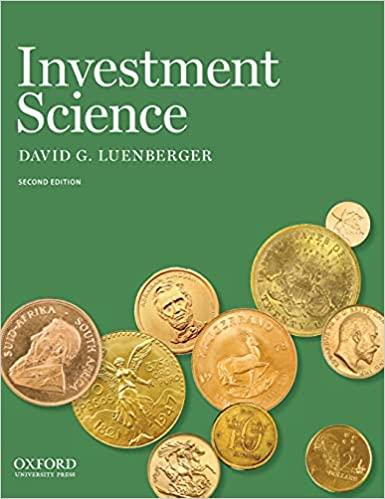Suppose that an obligation occurring at a single time period is immunized against interest rate changes with
Question:
Suppose that an obligation occurring at a single time period is immunized against interest rate changes with bonds that have only nonnegative cash flows (as in the $\mathrm{X}$ Corporation example). Let $P(\lambda)$ be the value of the resulting portfolio, including the obligation, when the interest rate is $r+\lambda$ and $r$ is the current interest rate. By construction $P(0)=0$ and $P^{\prime}(0)=0$. In this exercise we show that $P(0)$ is a local minimum; that is, $P^{\prime \prime}(0) \geq 0$.
Assume a yearly compounding convention. The discount factor for time $t$ is $d_{t}(\lambda)=$ $(1+r+\lambda)^{-t}$. Let $d_{t}=d_{t}(0)$. For convenience assume that the obligation has magnitude 1 and is due at time $\bar{t}$. The conditions for immunization are then
\[\begin{gathered}P(0)=\sum_{t} c_{t} d_{t}-d_{\bar{t}}=0 \\P^{\prime}(0)(1+r)=\sum_{t} t c_{t} d_{t}-\bar{t} d_{\bar{t}}=0\end{gathered}\]
(a) Show that for all values of $\alpha$ and $\beta$ there holds
\[P^{\prime \prime}(0)(1+r)^{2}=\sum_{t}\left(t^{2}+\alpha t+\beta\right) c_{t} d_{t}-\left(\bar{t}^{2}+\alpha \bar{t}+\beta\right) d_{\bar{t}}\]
(b) Show that $\alpha$ and $\beta$ can be selected so that the function $t^{2}+\alpha t+\beta$ has a minimum at $\bar{t}$ and has a value of 1 there. Use these values to conclude that $P^{\prime \prime}(0) \geq 0$.
Step by Step Answer:






